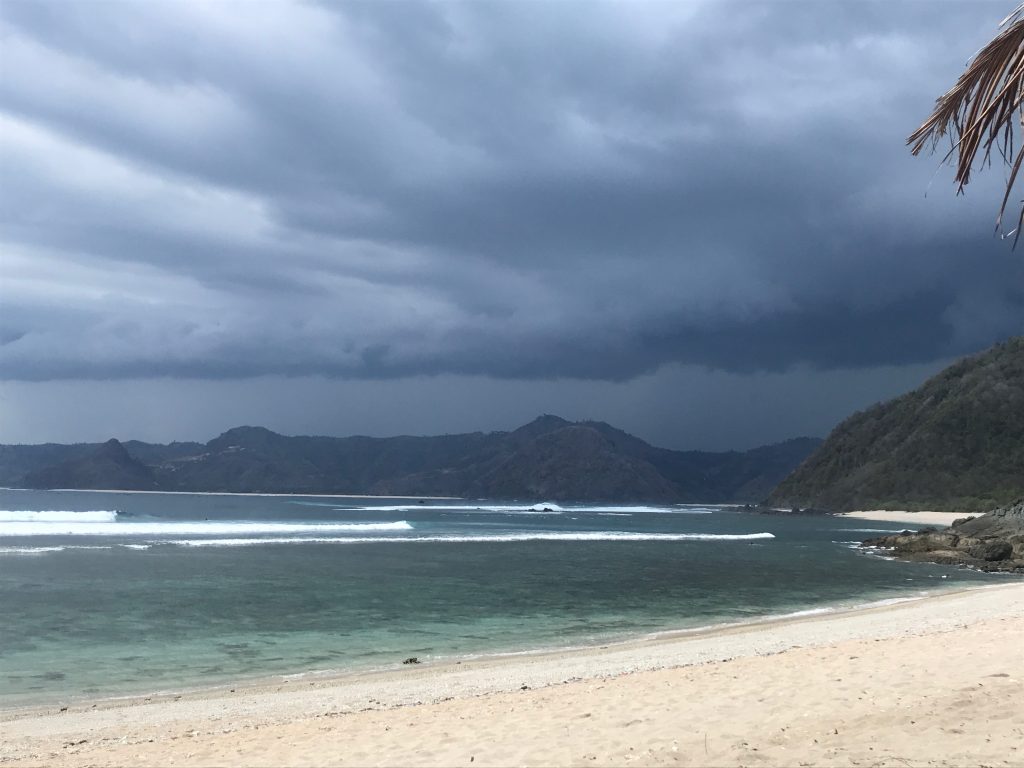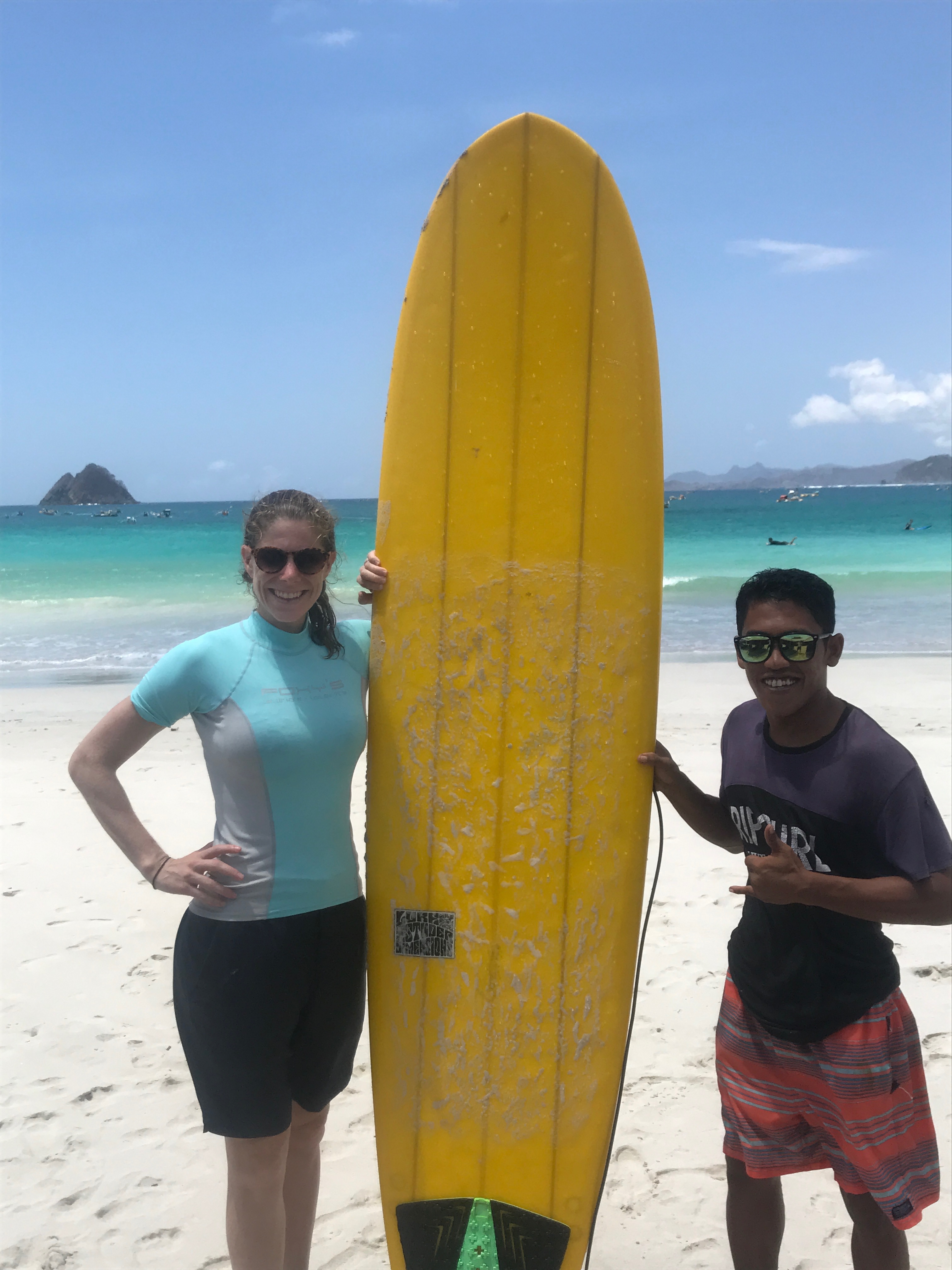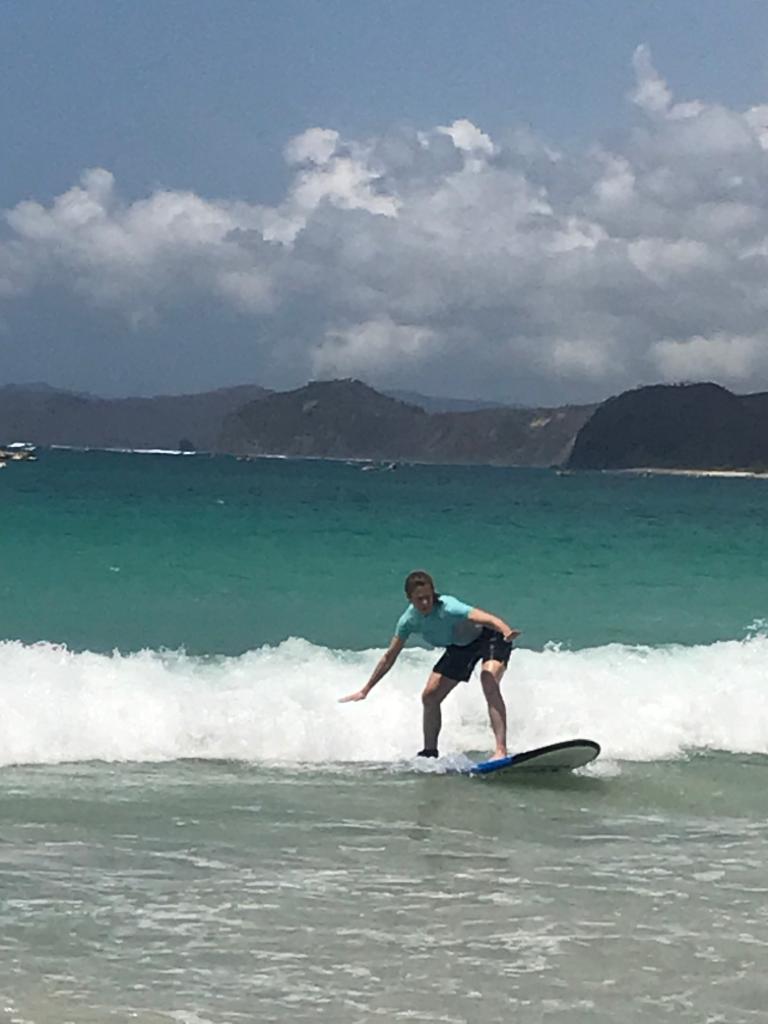My first 5 surf lessons crushed me.
It was my first time in a while trying something wholly new–not like tasting a new cuisine, but putting myself in a physical situation where it would clearly take repetitive failure and much practice in order to glimpse a modicum of success. I had never wake-boarded, snow-boarded, or participated in any similar sport, and I really knew nothing about the practice or culture of surfing. (There’s so much terminology! Goofy vs. regular, hard top vs. soft top, the line-up vs. the channel–With an Indonesian instructor who spoke only a little English, I felt like I was behind 2 language barriers!) I ended my first few days scraped up by coral, bruised from collisions with the board, covered in board rash on my hips and feet, and sunburnt to a crisp on the backs of my legs, but proud of the totally new skill I had persisted in tackling.
As I recover my land legs, I still feel the waves of emotion rolling in, each swell in the set bringing different feelings and reflections about both surfing and learning, in general.

- Sometimes you just have to grit your teeth and stay in the water: My first day of surfing was not the most auspicious start. We took a boat out to a reef and, although the waves seemed to all be 5 or 6 feet tall, I was assured I could learn on the edge. In one particularly nasty moment, I got crushed by a set of rolling waves, and my board boomeranged to lash against my head. Through sobs and gulps of saltwater, I paddled myself back towards the boat. “Where are you going?” the teacher called. “Out!” I gasped, exasperated. About halfway, I looked at the boat, and then back out at the lineup. I knew this wouldn’t be a break–if I paddled all the way in, I wasn’t going to give it another shot. So I sucked in a deep breath, and gave it a few more tries. I didn’t see success on day 1, but I also didn’t prematurely slam the door on surfing out of exasperation and fear.
- There’s no shame in a starter wave: I did not enjoy my first day surfing. The waves felt huge, and I felt completely adrift with so much new information. On day 2, we went back to basics. We found a beach with a tiny rolling wave just a paddle away from the shore. The waves had much less power, so a push from the teacher was all I needed to gain my footing and feel the ride of the wave. This experience gave me the confidence and framework I needed to continue trying because I was actually entering on the ground floor.
- You can’t rush nature: Victor and I loved the coastal paradise that is South Lombok so much that we bagged our plans for 9 days on Bali, and returned to Kuta Lombok after climbing Mt. Rinjani. On our first day back, we got all suited up to try surfing again and motor-biked 30 minutes to the starter beach where I had experienced success the previous week. The water was as still as ice. There wasn’t a single ripple of wave to be had. Despite our initial disappointment, this reminded us that surfing is a sport dependent on the whims of nature. The tides, the time of day, the swell, and the location matter, and If there’s no wave, there’s no surfing. Patience is key.
- Some challenges require finesse, not muscle: I have always flourished in sports where my own will power helps me succeed. In high school, my favorite part of basketball was taking charges–drawing a penalty by standing stock still while the opponent bowls you over. I love the me vs. the challenge will power required to drive myself to the finish line of a half-marathon or the peak of a mountain. Surfing is not this kind of sport. It requires dexterity and balance, timing and decision-making. Not all challenges can be overcome with grit alone.
- Success is rarely linear: In lesson 3, my best ride was the first wave of the day. In lesson 5, it took 4 tries for me to catch a long, stable ride, and I didn’t see another one for twenty more minutes of wipeout attempts. Assess and appreciate the good rides, but be prepared for ups and downs on the learning curve.
- You can’t always be 100% prepared: On my third day, I failed to catch one wave, but instead of making me wait out the entire set in the blistering sun, the instructor instantly said, “ok next one is for you.” I didn’t have time to mentally prepare myself as he pushed me into the next wave in the set, and I floundered. I got a knee up on the board rather than a full stance, but I rode the wave to completion in that half-up posture. The lesson here: sometimes you have to take the wave when it comes to you. Being willing to ride the wave on the spur of the moment with half-success was what I needed to keep up my learning momentum.
- Trust the experts: After wiping out in lesson 4, my instructor barreled towards me on a wave. I screamed, “what the hell are you doing?!” fearing he would crash into me. In retrospect, while I can’t predict the self-control of other newbies on the waves, your teacher is very unlikely to crash into you. Trust that they are coming to help, and try to only fear what might rationally cause you harm. Unnecessary panic impedes success.
- The sound of the wave is often worse than the crush: Keep your eyes forward towards the beach, not behind you at the rising wave or down at your struggling feet. Block out the sound of the wave building behind you. It’s just water. You won’t tackle your challenge if you let yourself get psyched out before you even begin. Be the master of your fear.
- Reps matter: Take a break when you need it, but get back in. Don’t go back to shore at your first yearning for a pause, and make the effort to get up early and put in your work hours, even when you’d rather roll over and go back to sleep. Every attempt, whether a success or a failure, has merit in the long-term learning process. Remember Malcolm Gladwell’s advice that it takes 10,000 hours to achieve mastery of any skill.
- Trust that your effort is working: I didn’t feel like I was getting a physical workout in my initial surfing lessons. However, after day 5 I was certain I had tighter ab muscles than I started with! You may not see success on the day to day level, but trust that the work is happening and paying off.
- Be kind to yourself: You may not know why you’re scared or tired. You may feel disappointed at yourself or regret for a failed attempt. Don’t underestimate the toll of the salt, the sun, and the exertion. Channel your inner child who can fail and bounce right back up to try again. Ride the roller coaster of learning with deep breaths, and smile at your willingness to try.






Leave a reply